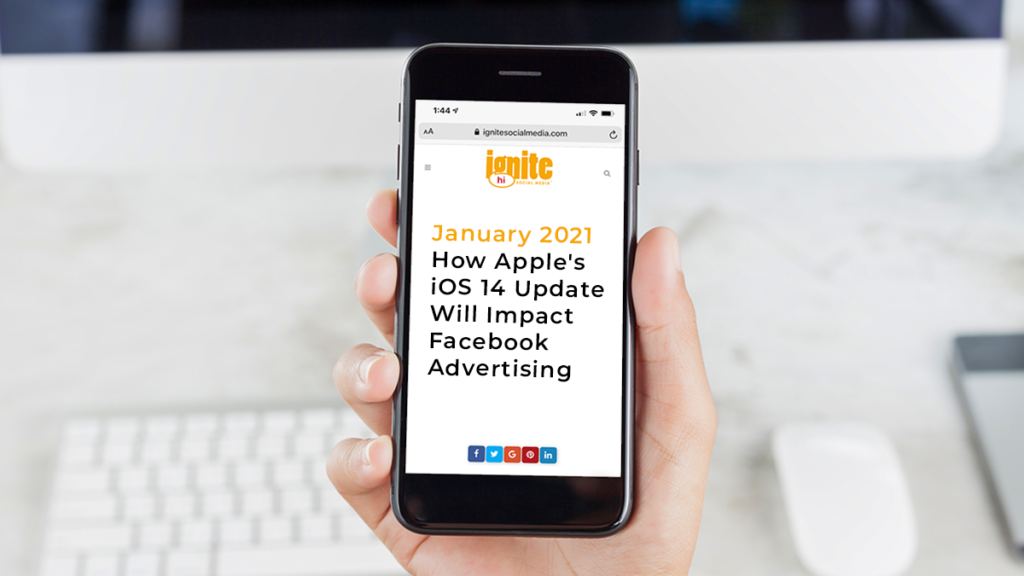21 Jan How Apple’s iOS 14 Update Will Impact Facebook Advertising
In the middle of 2020, Facebook began to raise the alarm on iOS updates and its impact on Facebook advertising. By December of last year, the alarm became more of a siren and now Facebook is urging advertisers to take swift action as several of the iOS privacy updates are expected to greatly impact advertising, including targeting, delivery, measurement, and reporting.

What These Shifts Mean for Your Business
Apple’s coming policy updates require App Store apps to ask iOS 14 users for permission to track their activity through apps and websites. With the current set up there is no limit to what the Facebook pixel can track after a user clicks on an ad. After the policy rollout, advertisers will only be able to optimize and report on up to eight (8) events per domain. The extent of the limitation will depend on if the user opts-in or opts-out of this data collection. When a user opts-in, Facebook will report on up to eight events, while if a user opts out, only one event will be reported.
To prepare for this policy change, advertisers will need to verify their domain in Business Manager and prioritize their top eight events for optimization. This is especially important when a user opts out of the data collection since Facebook will only report on one event (the highest priority event) after clicking the ad.
The default attribution window for optimization will also change from 7-day click and 1-day view and to 7-day click, which means Facebook will have limited data for optimization. Additionally, limited visibility will reduce the size of website custom audiences and likely increase overlap among audiences.
How Reporting and Attribution Will Be Effected
Expect data relying on the pixel to be delayed and incomplete. As only the highest-prioritized completed event will be reported (e.g., if an opted-out user completes a “purchase” event, the “add to cart” event action will not be counted). Facebook also expects that there will be a delay in reporting of 24-48 hours, especially for offsite conversions from users using iOS 14. Additionally, aggregated data will not include the ability to breakdown data by demographic.
While these actions will continue to happen on your website, they will not all be recorded so you will likely experience a decrease in reported results. Given the changes and limitations to reporting, reported ad efficiency will also likely experience a decrease. As is typical with these big platform changes, benchmarks from previous campaigns will not be as relevant a comparison when looking at the performance of campaigns executed after the iOS 14 implementation.
Actions Your Brand Will Need to Take
We recommend your organization takes the following actions to prepare for the iOS 14 rollout:
- Verify your domain in Facebook Business Manager if you haven’t done so already.
- Identify the eight conversions for your domain that will be shared across all accounts advertising on your behalf. These events can be adjusted in Events Manager. Note that when an event is changed it will be 72 hours before campaigns are able to use the updated events.
- Audit your current targeting strategy to identify which audiences you are currently using will be impacted by this change and determine alternative audiences to leverage going forward.
- Prioritize the implementation of Facebook’s Conversion API.
- Continue to leverage your on-site web analytics platform to provide additional insight when looking at referred social traffic behavior.
- Review Facebook’s iOS 14 checklist of changes to web events.
If your organization has any questions as to how these changes may impact your Facebook advertising strategy, contact our team today.
Additionally, keep yourself up-to-date on changes to Facebook ads as they happen, as well as other news and trends in the social media space by subscribing to our bi-weekly e-newsletter below.
Subscribe to Social You Should Know







